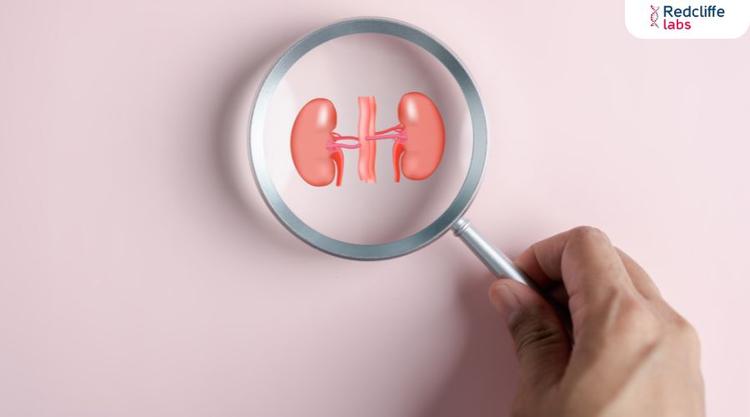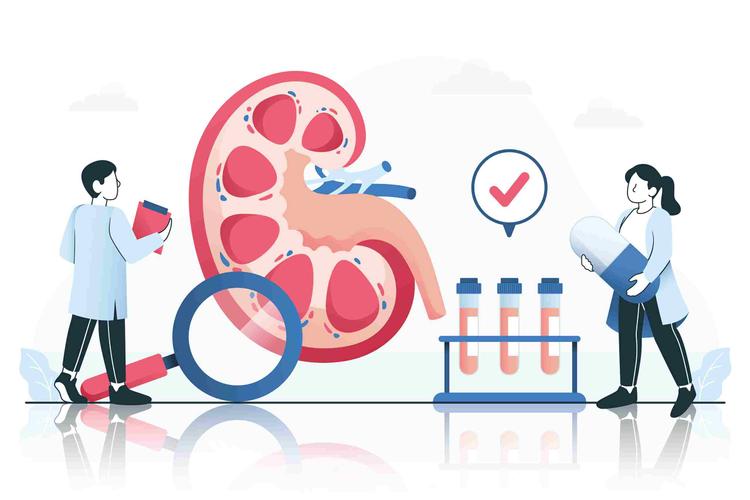Kidney Failure and the Role of Kidney Function tests

Medically Reviewed By
Dr Divya Rohra
Written By Komal Daryani
on May 10, 2022
Last Edit Made By Komal Daryani
on Dec 22, 2025

Kidneys are the bean-shaped organs that exist in the lower abdomen on both sides of the waist. Their main function is to remove body waste or fluid on a regular basis.
Kidney failure happens when the kidney becomes inefficient at removing or filtering toxins and fluids from the body. To replace these non-functional kidneys, one needs to depend on renal replacement therapies such as dialysis or kidney transplantation. For dialysis, the patient needs lifelong support of this method to remove waste from the body on a regular basis. And in kidney transplants or new kidneys, they also require lifetime care and management as well.
Signs and symptoms associated with the kidney are not easy to detect because they overlap with other similar symptoms existing in other illnesses. And it gets harder to detect unless diagnosed by a kidney specialist. Most of the time, a patient remains completely unaware of any kidney disease.
However, it is still necessary to be aware of the signs and symptoms associated with kidney diseases. Firstly, if you are already suffering with diabetes or high blood pressure-like problems, you should get screened for the kidney ailment at least once a year. The doctor will recommend a blood and urine test to detect the kidney function status.
Kidney Disease And Its Symptoms
Our kidneys are well adapted to perform their normal functions, but some diseases may interfere with those normal functions. If left untreated, they can gradually damage the entire kidneys. But symptoms cannot be felt easily until the disease gets to an advanced or untreatable stage. Some unusual signs and symptoms to give you more insight into kidney diseases are:
- Urine color change (yellow, orange, or red), frequent urination, or no urination at all
- Fatigue and weakness
- Foot, hand, and leg swelling
- Shortness of breath
- Itching all over the body and dryness all over
- low appetite and bad breath.
- Eye puffiness
- High blood pressure
- Localize the pain to the area around the kidneys.
- Anemia
- Electrolyte imbalance
- Nausea and vomiting
- Muscle cramps, swollen joints, and joint stiffness
- Feeling pressure during urination
- Foams in the urine
- Protein or blood in urine
- Confusion and headaches
Kidney Failure Treatment
In kidney failure, kidney function drops abnormally and there can be waste accumulation and water retention in the body. Thus, to replace the natural kidney and its functions, one has to depend on the following options:
- Kidney transplant
- Peritoneal or hemodialysis to remove waste
Some people who do not want dialysis or kidney transplants must take lifelong medications and must have their health and diet monitored on a regular basis.
Following the doctor's advice, treatment including dialysis, special diet, medicines, and physical activity can help to avoid symptoms associated with kidney failure.
Who Is At A Higher Risk Of Kidney Disease?
- People who are obese
- People with kidney stones and kidney infections
- Diabetics and hypertensive individuals
- People who smoke normally
- People with cardiovascular disease
- A person with a history of kidney disease in their family.
- Elderly people over 60 years of age
So, if someone has the above-mentioned risk factors that can develop chronic kidney disease, then it is essential to consult a doctor for the KFT test or kidney function test. Since kidney failure is the end or last stage of kidney disease.
How To Diagnose Kidney Failure?
There are a number of tests available to measure the proper functioning of the kidneys. If something is wrong with the kidneys, the doctor may recommend a urine test for the analysis of albumin, urine color, and other necessary parameters along with a blood test. He can also advise on a kidney biopsy, CT scan, ultra sound, or other imaging tests if required.
Kidney Failure And Its Causes
Kidney function can be affected by some kidney diseases that can completely hamper or damage its filtering and waste-removing abilities. Those illnesses can also affect the body’s metabolism, red blood cells, blood pressure-regulating hormone (rennin), and vitamin D production.
Acute kidney failure or sudden kidney failure may be due to direct damage to the kidneys, no blood flow to the kidneys, severe heart failure, or autoimmune disease.
Chronic kidney failure is also known as slow kidney failure, which can be caused by prolonged kidney disease. There are no specific symptoms, but high blood pressure and diabetes are the culprits.
The Main Causes Of Kidney Failure Are:
- Diabetes and high blood pressure.
- Polycystic kidney disease
- Kidney disease with a medullary cyst
- Reflex nephropathy
- Some medications, like NSAIDs and cyclosporin
- Some kinds of auto immune disorders, like lupus nephritis
- Hepatitis B or C
- Aids and HIV infection
- Infection of the urinary tract or pyelonephritis
How Does Diagnosis Help In Kidney Disease?
Some kidney illnesses are treatable, and it is also possible to stop them from worsening and ease the complications. And normal kidney functions can be restored by following the doctor’s advice from time to time along with some medical tests. The overall treatment depends on the type of kidney disease as well. If someone already has chronic kidney disease (CKD), early detection and proper treatment are needed to stop kidney failure.
In this regard, "Redcliffe Labs," one of the most well-known and trust-worthy chains of diagnostic labs, is working well. The company has committed to offering all its tests at the most reasonable price, including the kidney function test (KFT). For more information and to book an appointment to get the free home sample collection at your doorstep, contact the website www.redcliffelabs.com directly.
Disclaimer:
The blog content has been posted as a piece of information and awareness only. The content provided in this blog, or in any linked materials, are not proposed and should not be taken as medical advice. Redcliffe Labs strongly recommends users to consult with their health care providers to make any medical or health-related decision.



